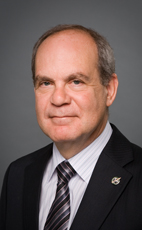Mr. Speaker, I would like to thank the member for raising Quebec's new action plan for commercial fishing and the aquaculture industry.
This plan is another fine example of a provincial initiative covering a wide range of interrelated issues. It contains many options and recommendations developed in partnership with industry. It will help Quebec fishers and aquaculturists ensure the economic viability of their businesses.
I would like to take this opportunity to outline what the Department of Fisheries and Oceans has been undertaking that complements and supports Quebec's action plan as well as the economic viability of commercial fishing and aquaculture throughout Atlantic Canada.
Two governments working together cooperatively can accomplish more for fishers and coastal communities certainly than the divisive party to which the member belongs.
The goal of our ocean to plate approach is to build on our cooperative efforts and better coordinate our policies and programs relevant to fish harvesting, aquaculture, processing, distribution and marketing in order to maximize economic value. For us to achieve this goal, it will require the collaboration of government agencies as well as engagement of all participants along the seafood value chain.
This plan will do more than the Bloc has done, or has been able to do, in 17 years, or will ever be able to do. In response to the member, let me focus on the ocean to plate approach we are taking as they pertain to the main themes of Quebec's action plan.
Let me mention three things, which all start with “c”.
The first is competitiveness. In the harvesting sector our government has strengthened and implemented a policy to protect the independence of inshore fishing fleets in Atlantic Canada by phasing out controlling trust agreements.
The department is committed to working with industry to change licensing policies in order to allow fish harvesters to hold more than one licence or to combine enterprises. Fisheries and Oceans Canada is also working to give traditional lending institutions more confidence in providing access to capital for fish harvesters.
The minister has also launched a commercial licence fee review to assess the cost on harvesters. In the short term, department officials are reviewing licence fee relief requests for shrimpers in Quebec.
In terms of regional shares, measures are in place for cod and halibut and we are currently working on seals and other species. The department is actively working with its provincial colleagues to develop a sustainable aquaculture industry in Quebec as well as the rest of Atlantic Canada.
The second is commercialization. Building on the ocean to plate approach, we recognize the importance of market awareness as it relates to the Canadian fishing industry. The department has taken on a facilitative role in working with our federal partners such as Agriculture and Agri-Food Canada, Foreign Affairs, International Trade Canada and the Canadian Food Inspection Agency to ensure the industry remains competitive abroad.
DFO is participating in the federal-provincial-territorial marketing working group, which is chaired by Quebec. DFO has also supported and participated in ocean to plate sessions on lobster, snow crab and cold water shrimp. These meetings involved participants from all along the seafood value chain and identified key market challenges and opportunities.
Critical to market access is the eco-labelling or certification under international standards. DFO is responding to this on a number of fronts, including fisheries sustainability check lists, contributing to marine stewardship council, certification process and a number of ways.
Finally, is consensus building and recognition. We are strongly in support of this priority and Quebec's action plan and will continue to support it. I would encourage the member to take a cooperative approach and we will get the job done.

